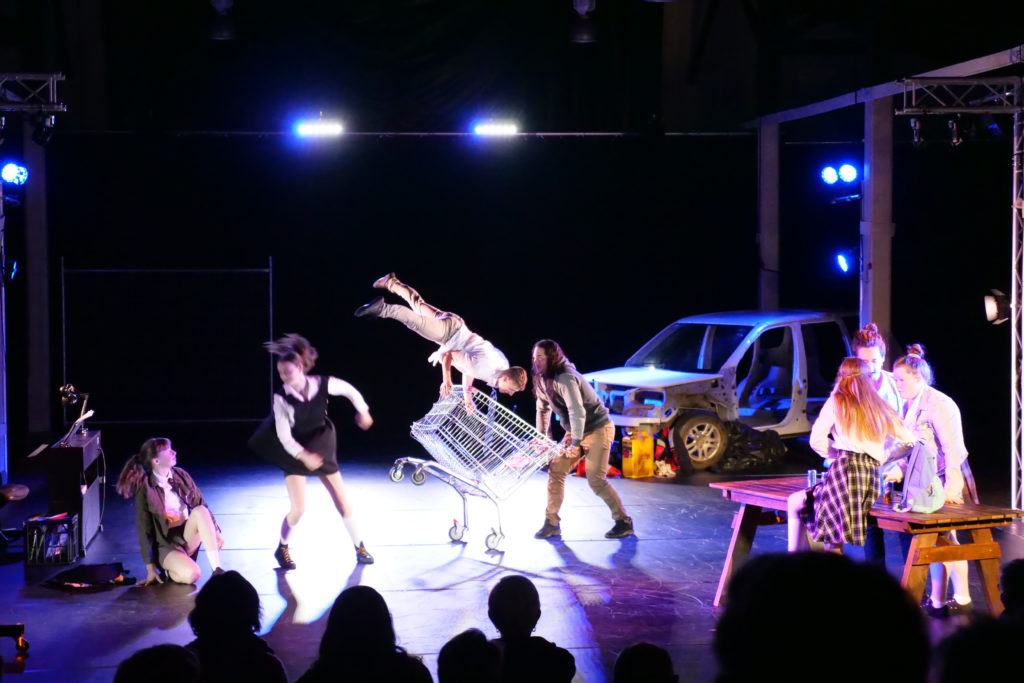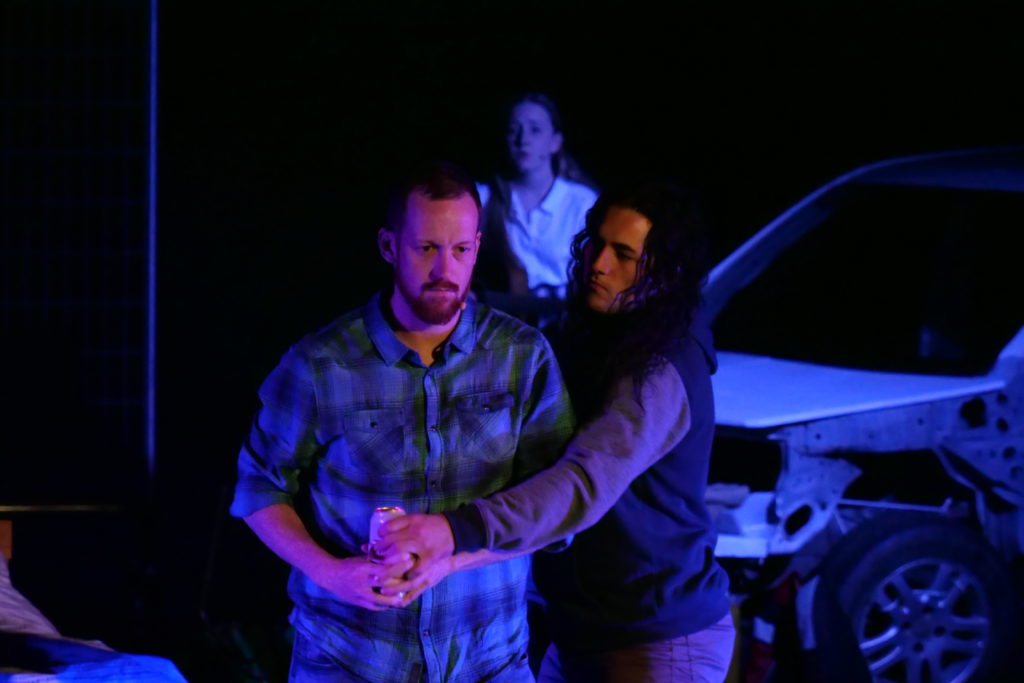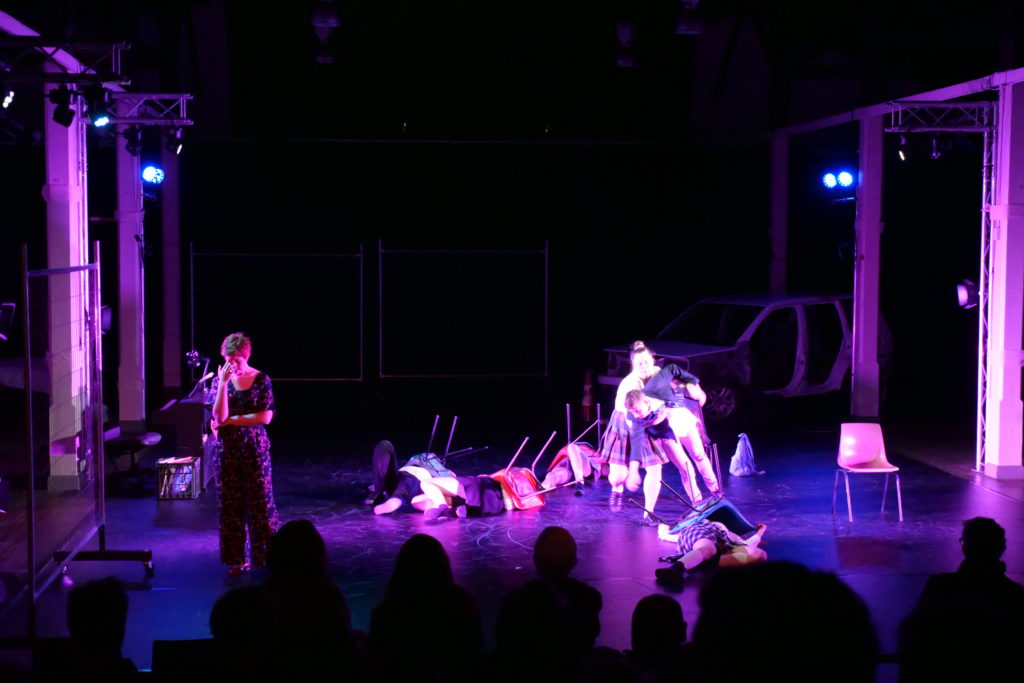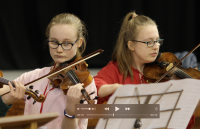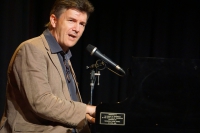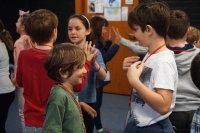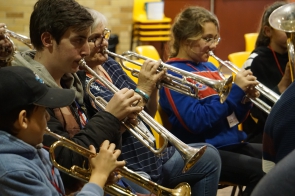Foundation for Rural & Regional Renewal (FRRR)
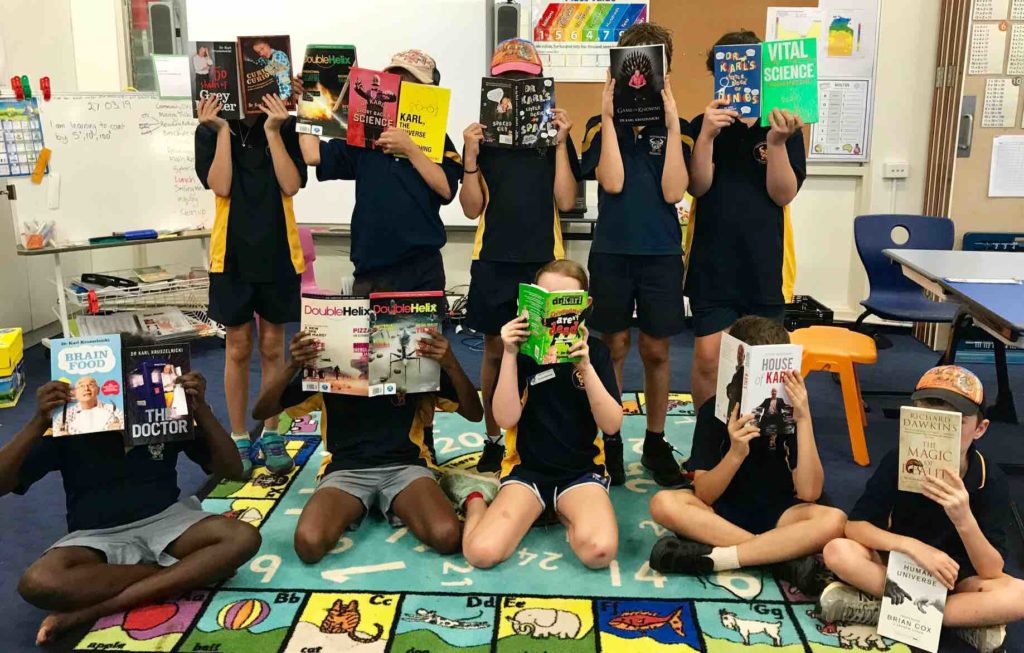
Did you know that some schools in remote Australian communities might have as few as 15 books in their library?
That discovery in 2017 prompted Corey Tutt to start sourcing and supplying resources himself, initially from his personal library. DeadlyScience Limited was established in 2020, and is now a registered charity. Through DeadlyScience, Corey is seeking to inspire a new generation of scientists.
It focuses on providing Science, Technology, Engineering, and Mathematics (STEM) and early learning reading resources to remote Australian schools to help increase engagement.
The initial priority is schools with a high proportion of Indigenous children. Where possible, and appropriate, DeadlyScience sources materials from Indigenous authors, artists, and translated versions in Indigenous languages. In the three and a bit years since inception, DeadlyScience has had more than 110 schools requesting resources.
They have delivered more than 16,000 books, 500 telescopes (and basic science kits), 80 educational resources and six greenhouses (plus seeds, and educational materials to support food production projects) to more than 100 Australian schools and/or communities.
This growth looks set to continue as the organisation gains more momentum and profile. Another key activity involves maintaining a website to support teachers in remote schools with access to high quality scientific research and relevant experts in their fields (also of Indigenous background, where possible).
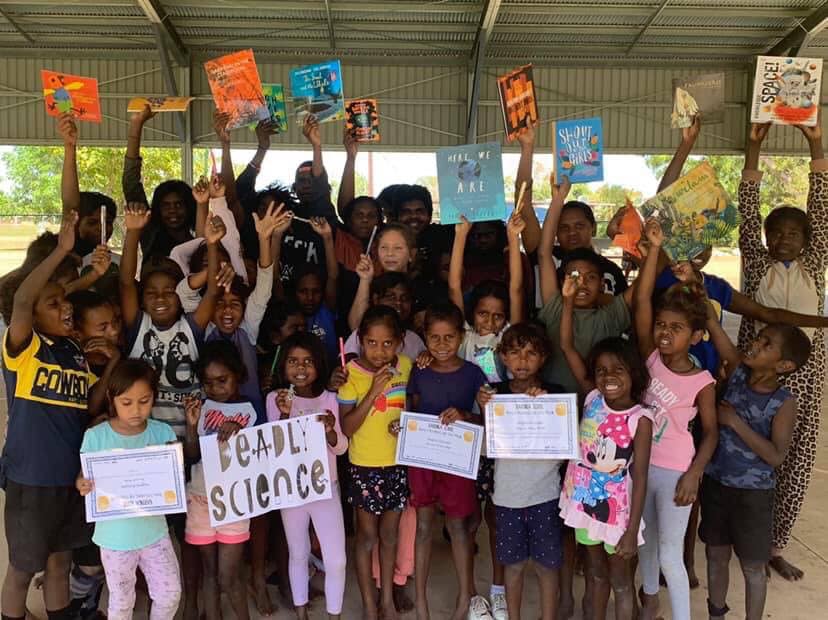
In 2020, DeadlyScience partnered with FRRR to set up a Not-for-Profit Fundraising Account, allowing them to attract tax deductible contributions from a broad range of donors to expand their activities and support the overall capacity and operations.
You can add your support by donate securely online, or check out the DeadlyScience website to learn more about their work.
To learn more about opening a Not-For-Profit fundraising account, get in touch with Jo Kemp.
Tackling stigma around youth mental health
Mental health difficulties are the most common health challenges for young people, with between 20-25% of Australian adolescents experiencing a mental health or substance abuse issue in any given year. In the Bega Valley, youth mental health has been identified as a major issue facing the region. With a lack of public transport, limited education opportunities and few social spaces for young people – outside of playing a sport – a youth dance organisation has become an important alternative and a vital hub for self-expression and creativity.
Bega-based fLiNG Physical Theatre provides opportunities for young people to work with local and visiting professional artists to create original contemporary performance projects. They aim to give voice to regional perspectives, and designed a powerful youth-centric research and performance project called ‘My Black Dog”, which set out to learn about and support the mental health of young people living in the Bega Valley.
The project had two components; the creation of a moving, original performance exploring youth mental health, and the design and delivery of wellbeing workshops for high school students exploring how they can creatively and practically support their wellbeing. But to deliver it, they needed increased resourcing and capacity.
A grant of $17,700 from FRRR’s In a Good Place program, funded by CCI Giving, was awarded and spread across the project to help realise the final performance outcome. It enabled the employment of two fLiNG Alumni, who returned to the Bega Valley to perform in the work, demonstrating potential future pathways for younger fLiNG Company members, who look to these people as role models. Funds also supported a local year 12 fLiNG Alumni to be employed to co-deliver the Art & Wellbeing workshops in schools around the region, ensuring the program is relevant and speaks on the level of those it’s being delivered to.
The live performance, entitled ‘My Black Dog’, was co-created with fLiNG Company members (14-18yrs) across all aspects of activity. The work’s themes – isolation, disconnection, grief and bullying – were set in a school context, and recognisable for many in the young audience. The uncomfortable territory also revealed the characters’ resilience and capacity for them to reach out and support one another.
It ran for a season of eight performances. This project reached more than 750 individuals, and the Art & Wellbeing workshops were delivered to 152 students in local schools. It all helped to break down stigma, learn about what is occurring in the community, and help generate conversation on an issue that is often difficult to talk about. Each performance was supported by local mental health professionals.
The community response to the show was exceptional, and many were inspired to share their own stories. Exploring and talking about the difficulties that young people come up against is the best way to begin to solve and heal them, and fLiNG Physical Theatre is contributing to the conversation in a highly creative and collaborative way. It was the recipient of the 2019 WayAhead Mental Health Matters Award for Youth, and shortlisted for an Australian Dance Award.
Gabriella Rose, fLiNG’s Co-Artistic Director, explained that the project has enabled a deeper understanding of how mental health issues may present in a young person, and what things can be done to support them.
“It has also revealed the enormity of the problem in regional areas, the lack of infrastructure and support available to isolated people. Through round table discussions with school welfare officers, mental health workers, parents and teens, it revealed how overwhelming the situation can be, but also how hard people are working to build better support structures around vulnerable young people in our community.”
The project’s final report also notes:
“Ultimately the My Black Dog project reiterated that within our community, mental health issues are common, and they can impact everyone. fLiNG’s Artistic Directors saw the Bega Valley community take up the offer to connect with this work and to start a conversation. The more we talk about mental health, the better we will become at looking after ourselves, recognising when we need support, and helping each other get through it.”
When a popular city-based summer school music program made plans to bring the beat to the bush and put on a show alongside it, the whole community of Tenterfield NSW let the rhythm takeover.
Recently ravaged by drought and fires, the small town was experiencing some hard times. Charitable organisation Hartbeat of the Bush teamed up with the Cuskelly College of Music’s Winter Music School in a bid to provide Tenterfield and the surrounding communities with a brief respite from it all – the result was a week long ‘Beat of the Bush’ festival during the July 2019 holidays.
Dr James Cuskelly has run a Summer School music program in Brisbane for years, but it was his long-held dream to bring the music back to the bush, to his roots. Despite the evidence that incorporating music in a child’s education shows life changing benefits, such as improving literacy, numeracy, confidence, behaviour and wellbeing, 63 percent of primary schools in Australia offer no classroom music. In regional and remote schools, there is limited or no musical and arts based education, and opportunities for children to actively participate as performers and artists, under the mentorship of professionals and in front of an audience, is rare and for some non-existent.
Hartbeat of the Bush supports arts, music and cultural development programs in regional and remote communities. This initiative was designed as a whole of community project, to enable participants to socialise with others from across and beyond their region. In total, around 160 participants attended the Winter School, travelling from Brisbane, the Gold Coast, Toowoomba, Ashford, Texas and Newcastle and lots of other little places in between.
The program kicked off with the Big Chilly Sing, a day-long singing and song-writing workshop that gave locals a chance to converge and get the toes tapping. This was followed by a range of courses and concerts for students of all ages delivered by more than 50 teachers, many of whom are internationally-acclaimed.
A range of concerts were also put on by the Winter School music educators themselves, which were attended by 220 people each night. Locals and visitors alike were treated to a folk concert, jazz performances, a chamber music concert, an opera night, a piano concert and of course, the final night culminated in one of the biggest concerts Tenterfield has ever seen. The finale was a rendition of the legendary Peter Allen song Tenterfield Saddler, performed by all of the Winter School attendees, and arranged by Pete Churchill, who led the Jazz studies program.
Musical experiences like this help children develop social skills and build confidence. Children from all over the region who had never met one another, played an instrument nor sung in a choir before this program amazed their family members with the talent and skills they had learnt in just five days. Many of these children are still in contact with each other and cannot wait for the next event.
What’s more, the economic benefits for the town were significant, with cafes, restaurants and retail outlets benefitting from a lot of foot traffic at a time when the drought impact was being deeply felt. A large number of local community groups were involved in some way, from making lunches and morning teas to providing venues for the concerts.
Hartbeat of the Bush President Ms Helen McCosker said it was a whole of community effort.
“The whole community was abuzz – even though we had had fires, drought and could no longer drink the town’s water, we had provided the businesses with a little sense of what was normal, something to look forward to and grow for our little country town.”
The $20,000 grant received by Hartbeat of the Bush was funded by the Australian Government through FRRR’s Tackling Tough Times Together program. This covered the costs of running free daily buses within a 100 km radius for commuters from Warwick, Bonshaw, Glen Innes and Tabulum, as well as accommodation at the local Tenterfield Motor Inn for tutors (both overseas and those from Brisbane) and volunteers.
24 projects funded that will bring young rural Australians’ ideas to life
The Foundation for Rural & Regional Renewal (FRRR) has awarded $185,855 in grants for 24 community-led projects that will help tackle the real, and at times confronting, issues faced by young Australians living in rural, regional and remote areas of the country.
Funded through the FRRR ABC Heywire Youth Innovation Grants program, these grants will support local community groups to adopt, adapt and implement one of six ideas that were developed by 55 young leaders who attended the 2020 ABC Heywire Regional Youth Summit. These ideas address the most pressing issues facing young Australians, including the environment and climate change, cultural inclusivity and diversity, access to education and shared spaces, and career pathways in agriculture.
Now in its eighth year, the Youth Innovation Grants are usually announced at an event hosted by the ABC. This year, due to COVID-19, community groups were awarded their grants at a virtual awards ceremony earlier this afternoon.
The 24 projects will support young people in rural communities throughout Australia, ranging from as far north as Alice Springs in the Northern Territory, to Sippy Downs in Queensland, Orange in New South Wales, Golden Square in Victoria and Hobart in Tasmania, across to Karoonda in South Australia, and as far west as Geraldton in Western Australia.
Natalie Egleton, CEO of FRRR, said that although each place has its unique challenges, these grants show that there are common themes and concerns among young people throughout rural Australia.
“We’ve been heartened to see such an impressive response from rural communities wanting to address these six ideas and implement them in ways that are relevant and meaningful to the young people in their own community.
“We are inspired by the work that the ABC does to help shine a light on the issues affecting young people and thank our donor partners for their continued support. It’s through these partnerships that FRRR is able to support communities and their young leaders to come up with ideas and solutions that empower them to forge their own future,” Ms Egleton said.
ABC Director, Regional and Local, Judith Whelan, said that these young leaders and their ideas demonstrate the strength and resilience of Australia’s rural and regional communities.
“Heywire is a fantastic demonstration of the ingenuity of our young people and, thanks to the support of FRRR and its donor partners, we can help bring their inspiring ideas to life. It’s clear from this year’s Heywire ideas and Youth Innovation Grants that Australia’s future is in good hands.” Ms Whelan said.
2020 Heywire Winner, Sam Kane, from Golden Square, Victoria, was one of the young leaders that developed Skillin’ It – a locally-driven initiative that enables knowledge-sharing between individuals and community organisations to build skills that young people are keen to learn about.
“I’m thrilled that Skillin’ It, an idea that our group of 6 young people developed while at the Heywire Regional Youth Summit, is now being piloted in my local community in Central Victoria.
“To be part of this project from the brainstorming, to it now being implemented in my community with a partner organisation, means a lot to me – and shows just how far one idea can go,” Mr Kane said.
Some of the other projects inspired by the six Heywire Youth Innovation Grants ideas are:
- Centralian Senior College, in Alice Springs, NT received $10,000 to adapt the Filling The Gap idea by providing Alice Springs youth with the opportunity and platform to Fill the Gap in education by telling local Indigenous stories, to be incorporated in local curriculum and promoted throughout the community.
- City of Albany, WA received $9,038 to adapt the Green Book idea by promoting grassroots environmental activities through the delivery and filming of five hands-on environmental workshops that will be released at Albany Sustainability Festival and through schools.
- Towri Aboriginal Corporation in Bathurst, NSW received $10,000 to adapt the L.E.D. (Let’s Embrace Diversity) idea by celebrating the rich culture and history that Aboriginal people have to offer by enabling local youth to lead local education.
- Northern Gulf Resource Management Group in Dimbulah, QLD received $9,979 to adapt the We Need Farmers idea by developing relevant local educational resources for schools in the Northern Gulf Region through the creation of three, youth-created farming documentaries.
- Yarram Neighbourhood House, VIC received $10,000 to adapt the Skillin’ It idea by cultivating youth skills in project planning, hospitality and horticultural skills through the establishment and delivery of a foodbank and community garden program.
- Migrant Resource Centre (Southern Tas) in Hobart, TAS received $10,000 to adapt the Filling the Gap idea by empowering young people from migrant and refugee backgrounds to educate the wider community about their culture and histories.
- Stand Like Stone Foundation in Mount Gambier, SA received $10,000 to adapt the Just Relax idea by promoting understanding about life with disability across area schools by the delivery of a hands-on, educational program.
To date, through $1.2 million in community and philanthropic investment, including the support of a number of donors, such as The Sally Foundation and the David Mactaggart Foundation, the FRRR ABC Heywire Youth Innovation Grants have helped to implement around 100 youth-developed projects in more than 160 communities.
The full list of grant recipients and their projects are below.
Jump to: Filling the Gap | Green Book | Just Relax | L.E.D. | Skillin’ It | We Need Farmers
|
Organisation |
Project |
Location |
Grant |
|---|---|---|---|
|
Centralian Senior College |
Provide Alice Springs youth with the opportunity and platform to Fill the Gap in education by telling local Indigenous stories, to be incorporated in local curriculum and promoted throughout the community. |
Alice Springs, NT |
$10,000 |
|
Chancellor State College |
Enrich the education of Chancellor State College and empower young people by providing a number of excursions and workshops, where students can learn about diverse cultures, and share their learnings with the student body. |
Sippy Downs, QLD |
$9,740 |
|
Migrant Resource Centre (Southern Tas) Inc |
Empower young people from migrant and refugee backgrounds to educate the wider community about their culture and histories. |
Hobart, TAS |
$10,000 |
|
Snowy Mountains Grammar School Limited |
Increase access to environmental education and empower young people to spread environmental messages through workshops and blogs. |
Jindabyne, NSW |
$2,880 |
|
Alice Springs Town Council |
Provide access to youth education on environmental actions and host a youth-led climate change seminar featuring environmental workshops. |
Alice Springs, NT |
$8,429 |
|
Bundaberg Regional Council |
Upskill youth development action team to enable delivery of hands on environmental activities and an educational awareness film event for youth. |
Bundaberg, QLD |
$10,000 |
|
Beechworth Secondary College Student Representative Committee |
Rejuvenate edge of the Beechworth Secondary College school grounds to increase biodiversity in fire ravaged environment and create an outdoor classroom. |
Beechworth, VIC |
$9,600 |
|
City of Albany |
Promote grassroots environmental activities through the delivery and filming of five hands-on environmental workshops that will be released at Albany Sustainability Festival and through schools. |
Albany, WA |
$9,038 |
|
headspace Geraldton |
Promote environmental awareness through participation in conservation works at a youth camp and delivery of local environmental solutions via video productions. |
Geraldton, WA |
$4,555 |
|
Youth Action Committee of Karoonda East Murray |
Improve disability access and road safety through the development of a concept plan to establish a safe walking / riding / wheelchair accessible pathway. |
Karoonda, SA |
$9,600 |
|
Just Relax: Let’s talk about (Dis)ability |
Promote understanding about life with disability across area schools by the delivery of a hands-on, educational program. |
Mount Gambier, SA |
$10,000 |
|
Towri Aboriginal Corporation |
Celebrate the rich culture and history that Aboriginal people have to offer by enabling local youth to lead local education. |
Bathurst, NSW |
$10,000 |
|
Council of the City of Broken Hill |
Celebrate diversity and empower local youth through a Colour Run #neonglow. |
Broken Hill, NSW |
$5,050 |
|
St Giles Society |
Increase awareness of Tasmanian youth with a disability to enable visibility of life challenges and foster community-wide change. |
Launceston, TAS |
$9,000 |
|
Autism Support Network Albany Inc |
Increase awareness and understanding of Autistic young people in the Albany community through the production of short videos. |
Albany, WA |
$617 |
|
Part of Things |
Upskill youth through creation of a youth-led digital bank of workshops to be presented at an International Youth Day Festival. |
Barmera, SA |
$10,000 |
|
Glenhaven Family Care Inc |
Build community resilience and increase opportunities for youth employment through workshops in job readiness training for youth. |
Sheffield, TAS |
$4,547 |
|
Jumpleads NFP Limited |
Develop skills of ten young people through a mentoring program which will result in the completion of a community project. |
Golden Square, VIC |
$10,000 |
|
Yarram Neighbourhood House Inc |
Cultivate youth skills in project planning, hospitality and horticultural skills through establishment and delivery of a foodbank and community garden program. |
Yarram, VIC |
$10,000 |
|
Boyup Brook Community Mental Health Action Team Inc |
Increase access to learning opportunities via two 10 week ‘Skillin’ It’ programs for youth. |
Boyup Brook, WA |
$5,600 |
|
Shire of Collie |
Support life skills development through provision of ‘Skillin’ It’ workshops for youth in Collie. |
Collie, WA |
$6,000 |
|
Bowraville Central School |
Highlight opportunities in farming industries through creation of school resources by senior students and excursions to local farms. |
Bowraville, NSW |
$3,220 |
|
UCA – Kinross Woloroi School |
Create an awareness of opportunities in agriculture via youth producing seven video documentaries and learning resources for primary schools in the region. |
Orange, NSW |
$8,000 |
|
Northern Gulf Resource Management Group Ltd |
Develop relevant local educational resources for schools in the Northern Gulf Region through the creation of three youth-created farming documentaries. |
Dimbulah, QLD |
$9,979 |
Content warning: this article deals with sensitive themes including self harm that might be disturbing for some audiences.
For students facing adversity in communities across SA’s Eyre Peninsula, a long-running resilience program helps them to create a future where they not only cope, but thrive.
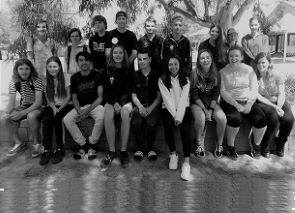
Youth Opportunities runs a 60-hour, 10-week wellbeing and resilience program that provides young people, especially those that are disengaged and disadvantaged, with the tools and knowledge to overcome obstacles associated with life’s challenges – from bullying and anxiety to family dysfunction and drug and alcohol abuse.
In SA’s eastern and western Eyre Peninsula, drought is impacting on local families, increasing financial strain and social isolation. Port Lincoln High School, Tumby Bay High School and Whyalla High School report more than 30% of families are receiving financial assistance with school fees and materials. Statistics show farming communities across the state experience mental health problems at twice the rate of the general population, and for youth in the area, opportunities are low and suicide rates are higher than average.
The powerful program has found a 52.1% reduction in the number of teenagers at high risk of developing a mental health disorder as a direct result of training with Youth Opportunities.
Grants Officer, Mrs Sacha Burkett talks of a ‘ripple effect’ from the program. “This comes from young people making significantly better life choices, strengthening their personal relationships and becoming strong leaders amongst their communities.
“Following the delivery of our first program in Cummins, one local council member told Youth Opportunities she had “clearly witnessed much more community spirit and a behaviour change in young people in town”.
Youth Opportunities is structured to heavily subsidise the cost of delivery so the burden isn’t placed on budget restrained schools and low-income families, but remains accessible to those who need it most. The program has been running at schools successfully since 2008, but local drought and financial stress means there has been a decreased capacity to fundraise locally for the program to continue.
Against this backdrop, FRRR awarded a $20,000 grant, through the Tackling Tough Times Together (TTTT) program, thanks to the support of the Australian Government. The grant part-funded local trainer’s salaries, training materials, administration, travel, graduation costs and sustained graduate engagement.
Across the three schools, 54 Year 10 students (aged 15 and 16) attended the program. Trainers combined practical experience and coaching, delivering content within a supportive group environment, extending the groups’ skills ‘in areas not typically part of school, but important for life’. Upon completion there was a Graduation Ceremony celebrating the journey, personal changes, achievements and outcomes of the students.
Feedback from the students illustrates the immediate benefits on their outlooks:
- “I am feeling a lot happier and I am pushing myself harder to achieve my goals.”
- “I have developed the confidence I need within myself.”
- “Youth Opps has really changed the way I think about everything, by not looking back and moving forward in life.”
- “By opening up to challenges and new habits, I have found a new side of myself I never thought I would find.”
- “Youth Opps has helped me to see my worth.”
All graduates are now being supported to reach their educational and personal goals through an additional two years support from Youth Opportunities trainers, focusing on reinforcing program content and helping graduates continue to achieve and succeed post-program.
Mel Degner, Principal Cummins Area School, wrote that the program cuts through and proves relevant for students of all backgrounds, giving them significant long-term skills and strategies.
“Through the Youth Opportunities Personal Leadership Program, many of our students reconnect with their families by learning how to communicate more positively, others change their goal planning to include further education or a newly discovered career path, and the majority discover important things about themselves and begin to value their self-worth.“
Similarly, Nicky Prosser, Principal Tumby Bay Area School, says the program has contributed to a positive shift in school culture, helping students manage their responses to negative experiences.
“Youth Opportunities delivers valuable outcomes for or students – positively impacting classrooms, friendship groups, families and the wider community.”
FRRR is delighted to have been able to support a program making such a positive difference.
In Eden and the wider Far South Coast region of NSW, there has long been a problem with disengaged and disadvantaged youth. Youth unemployment accounts for 25% of all unemployed people in Eden (ABS, 2016). Twelve percent of students in Eden don’t complete year 12, which is double the state average. Young people are unable to get meaningful employment or job-ready skills, and as a result become disengaged. It is a problem that poses a challenge for many communities.
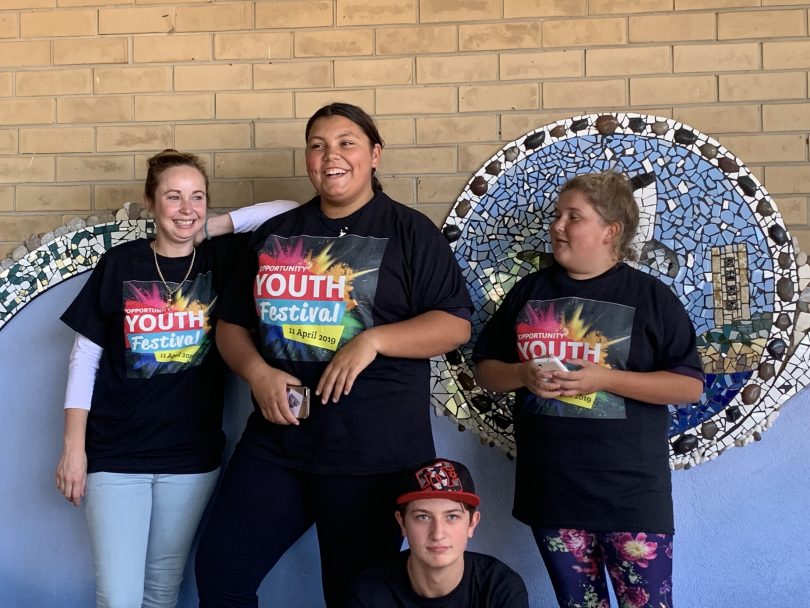
The Eden Game Development Centre in conjunction with the Eden Community Access Centre received a grant for $9,262 through the FRRR ABC Heywire Youth Innovation Grants program. It was to deliver their version of the Heywire Step Up initiative to inspire disengaged young people to take the first step on their journey to success.
William Sharples, who led the development and implementation of the project, drew on his personal experience to inspire and motivate a team of young people to facilitate the ‘Opportunity Youth Festival’, which was held in Eden in April 2019. Like many others in his community, William had tried to seek meaningful and enjoyable work, but living in a rural town, felt his opportunities were limited.
Discovering a passion for video game development and coding, along with the suport of a few key mentors meant William became more engaged. He has followed his dream and now runs the Eden Game Development Centre, teaching young people tech skills like coding, game development and virtual reality.
As a Heywire Trailblazer alumnus, William jumped at the chance to adopt and adapt the Step Up idea to create a fun event, featuring free food and great entertainment, to attract local young people. To ensure it resonated with local youth, he involved young people in the planning and execution of the day.
With so many people and local organisations putting in efforts to create opportunities for local young people, this was a great chance to showcase the opportunities in a fun and engaging manner to attract young people to investigate options available to them.
The theme of the festival was ‘opportunity’ and there was plenty of that to go around. Around 400 youth came from all over Eden and surrounding areas to spend a day showing off their talents, as well as learning about what the future might hold for them.
Weeks of planning by the Youth Project Committee resulted in a spectacular day of fun and frivolity, including local youth bands and singers, displays from 35 services and sporting organisations, and plenty more activities.
Feedback was very positive, with participants and services asking if the event was going to be held again in 2020. In acquitting their report, Eden Community Access Centre said they found their greatest success (and challenge!) was letting youth ‘run the show’, with the Steering Committee merely facilitating their ideas and keeping the event safe and within budget.

